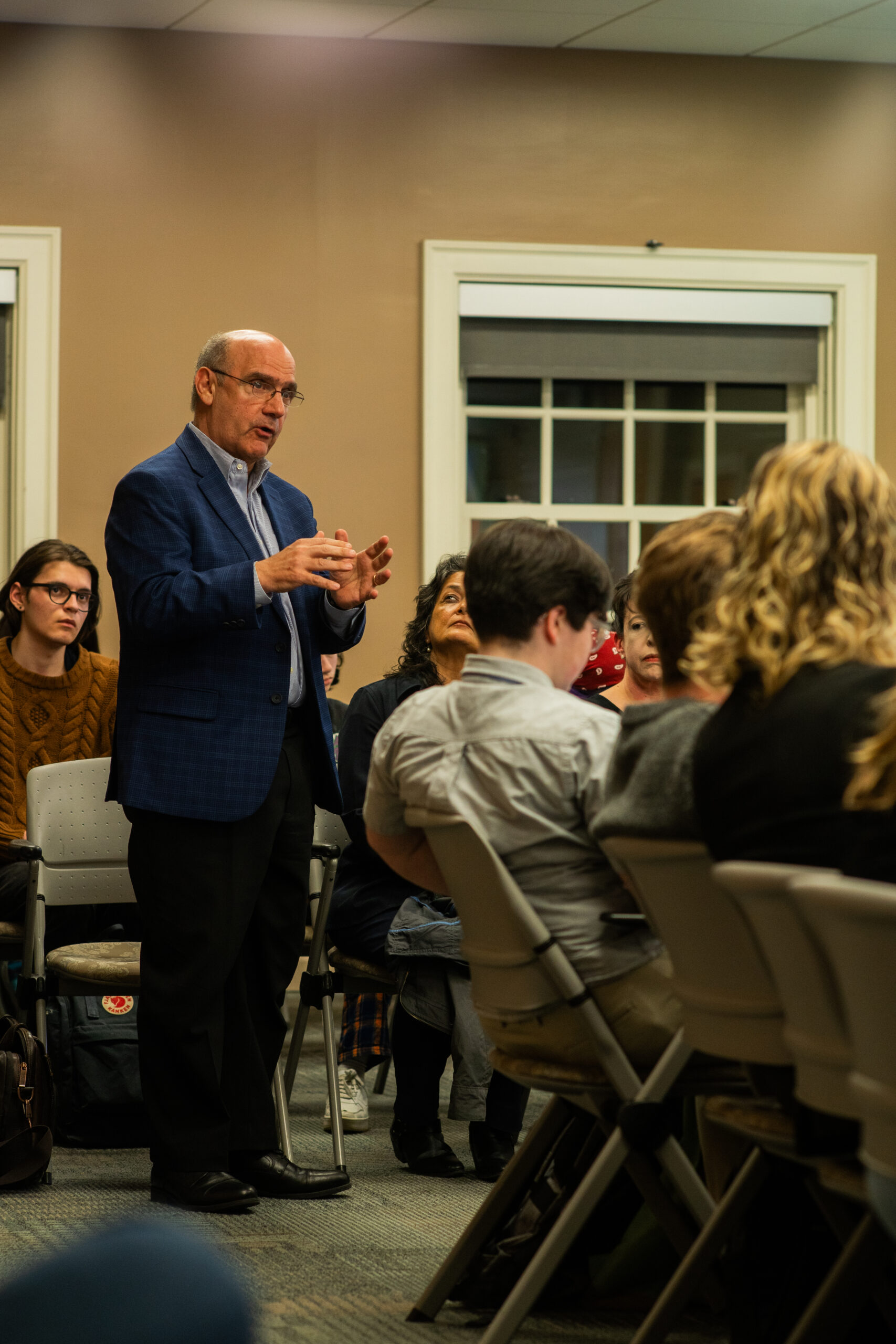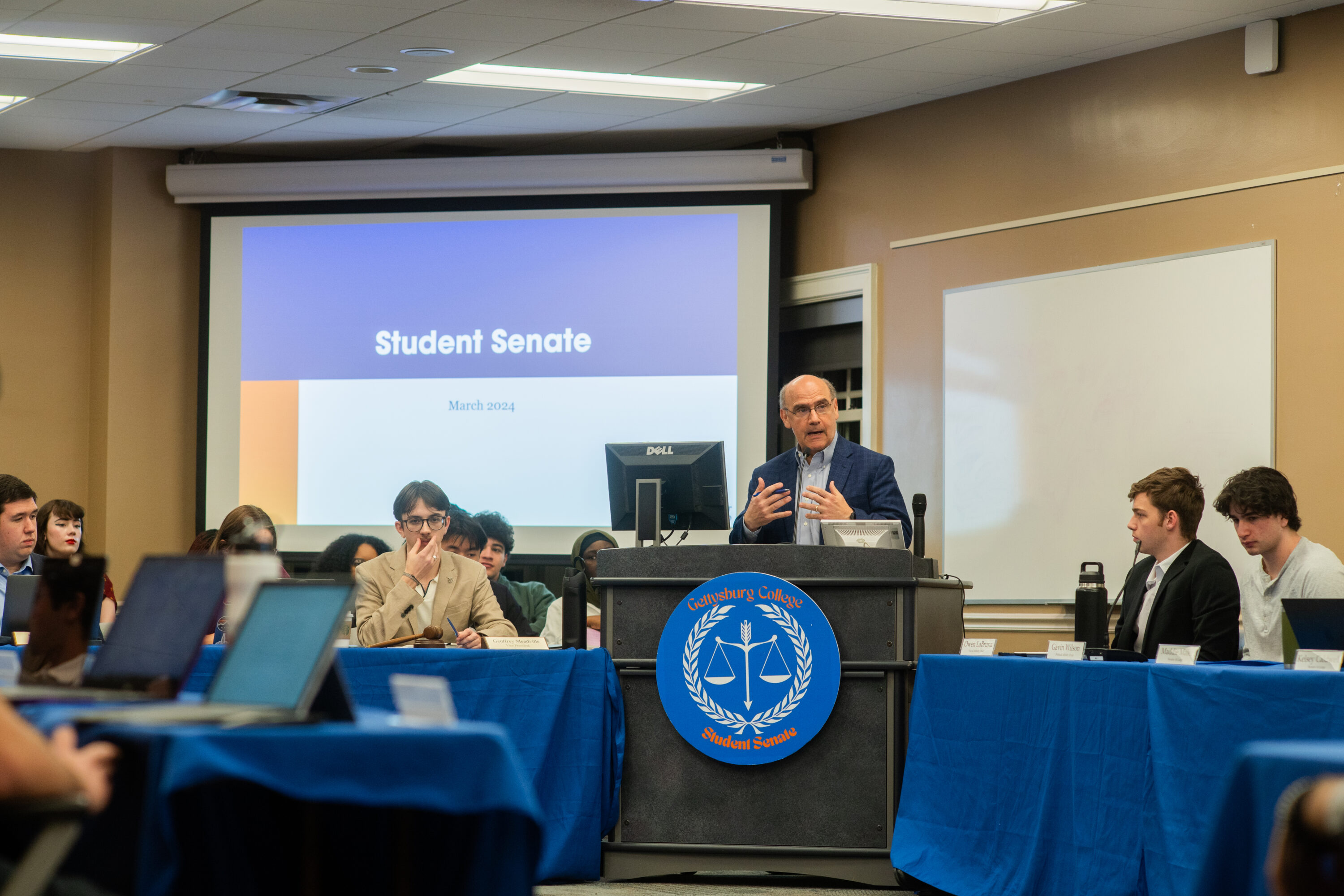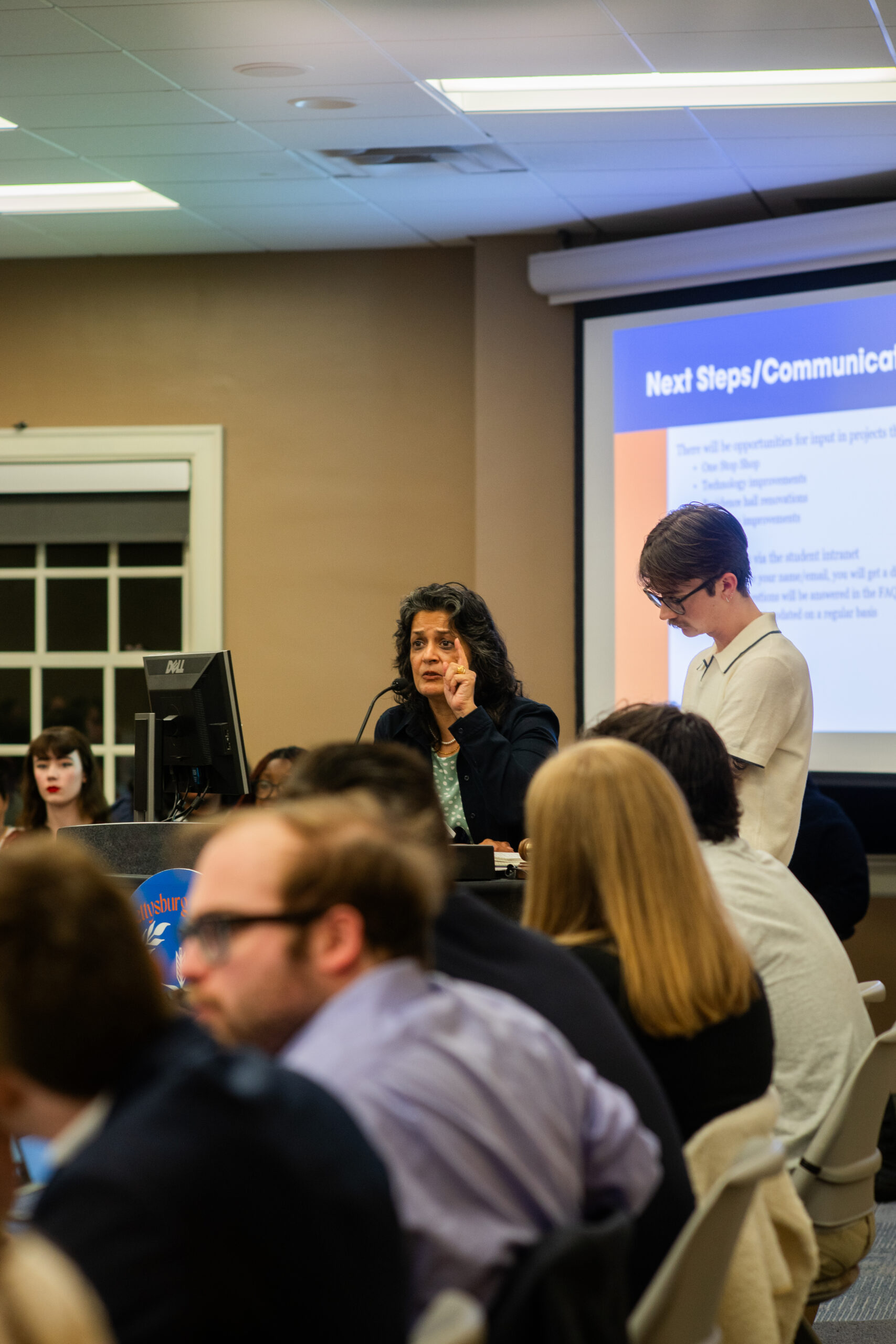By Laken Franchetti, Editor-in-Chief, and Ella Prieto, Managing Editor
Various colleges and universities are beginning to face the demographic cliff, meaning a loss in their student populations. The Chronicle of Higher Education explains that the cliff is a result of the 2008 recession, which led to couples having fewer or no children. As the nation reaches roughly 18 years since the recession, those fewer children are impacting the size, and therefore tuition income, of institutions.
Gettysburg College is dealing with this challenge by making cost-effective decisions, most notably seen with the closing of the College’s literary journal The Gettysburg Review last semester. This generated outcry from faculty, students and alumni, and resulted in many questioning the decisions of the College’s administration. At a Student Senate meeting on Oct. 16, senators and students in the audience shared their dismay over other choices as well, such as the increase in class sizes, minimum enrollment numbers and cutting non-tenured staff.

President Bob Iuliano answering questions at the Student Senate meeting on March 4. (Photo William Oehler/The Gettysburgian)
This semester, the College Administration is working to alleviate these worries through improved transparency. President Bob Iuliano, Vice President for College Life Anne Ehrlich and Provost Jamila Bookwala presented to the Student Senate on March 4 with this goal in mind. Additionally, Iuliano and Bookwala met with The Gettysburgian following that presentation to answer further questions.
A large portion of their presentation and overall rhetoric focused on the increase in transparency through a variety of avenues. To begin, the trio hopes that their Student Senate visits ease student concerns.
“I think we’ve really made a point of making sure the campus is as informed as it can be about what we’re doing, why it matters and where we’re going because there are challenges but there are also opportunities,” shared Iuliano. “….[So] we were at the [Student] Senate in the fall, which was open, so people got to ask whatever they wanted to ask.” This same structure was continued during their visit during the spring.
Bookwala added, “I think it is critical that we be as transparent as we can, making sure that we’re protecting privacy and confidentiality, but if there’s information [we can be sharing] then we are sharing it.”
They also stressed the importance of two-way conversations instead of the administration only talking at students. This is being accomplished through the new intranet site, which gives students access to information similar to what faculty receives and provides a portal to submit questions. However, some students expressed concern over the fact that students can only access the intranet with a login.
Ehrlich addressed these concerns, explaining that it is only available through a login because the information is unique to the Gettysburg College community and would be difficult to understand without context.
Another avenue for transparency is through Iuliano’s office hours, which he recently moved to be held in the College Union Building (CUB) in hopes it would attract more students.
“If we’re all rowing in the same direction, we’re more likely to get to the destination we want to go,” said Iuliano. “So I had more office hours [because] the more we can talk, the better it is.”
Along with transparency, the College is working to improve everyday life for current students while also attracting new students. One of these changes has been the expansion of the Center for Career Engagement (CCE) to accommodate student needs in relation to experiential learning.
For students in the Guided Pathways Program, a personal advising team will partner with them to identify what career-ready experience best intersects with their career aspirations. These career-ready experiences include an off-campus or on-campus internship, working on a long-term Center for Public Service project, foreign travel through the Center for Global Education, holding a campus leadership role or participating in faculty-mentored research.
Iuliano further explained how the expansion of CCE assists with the Guided Pathways Program: “We have added personnel to the Center for Career Engagement, one of whom is exclusively focused on creating relationships with industries so that it is going to be easier for students to find internships. We have announced guaranteed career ready experience for people going through the [Guided] Pathways, which will make sure that they have the opportunity to do something that is hands-on.”
“Our goal is to equip you [students] with this depth and breadth of knowledge and the set of skills that are going to permit you to navigate no matter what life throws at you—professionally and to some extent, personally,” Iuliano explained.
At the Student Senate meeting on March 4, Iuliano also revealed that the College had the best fundraising year in its history. He believed this to be a testament of the enthusiasm that the College’s alumni and friends have for the College’s purposeful mission.
“I think there is genuine excitement about the Strategic Direction. I believe that we are thinking in different ways about how to prepare you, and I think that makes a difference,” Iuliano said. “It’s the mission. It’s the connection people have to the College.”
Other changes being made to improve everyday life for current students and to attract prospective students includes the newly proposed majors being brought forth from the faculty.
At a faculty meeting on Feb. 15, on behalf of the Economics Department, Associate Professor of Economics Brendan Cushing-Daniels brought forth a faculty-led proposal to create a new major: finance and economics. If approved, the major would have been offered starting in the 2025-2026 academic year.
“This is not a new development,” Bookwala added. “They [the Economics Department] have been talking about this for many years, and they wanted to really address this gap in their department, and also this need that prospective students have mentioned, as well as students we’ve [Gettysburg College] had over the years. Potentially, it could be a really great program.”
At a faculty meeting on March 21, more lengthy discussions occurred surrounding the major’s potential impact on the College’s finances. Following a faculty vote during the same meeting, the proposed major did not pass.
Another proposed major will soon be presented to the faculty: public health policy. This proposed major has also been faculty led, and the Provost’s Office has helped to facilitate these proposals and discussions.
“It’s really the combination of health sciences and public policy,” Bookwala shared. “They’ve come together—the faculty from both departments—and have put together this really innovative idea of how to think about public health policy.”
Another change occurring for students will be in relation to course schedule improvements. Likewise to some of the earlier information, this news was released during the Student Senate meeting on March 4. Associate Provost for Academic Affairs Jeanne Hamming conducted a study of the current class meeting schedule, which revealed a variety of overlapping teaching patterns and conflicts for students.
“These conflicts, in turn, constrain students’ course options,” Hamming explained. “From what I have learned, departments have done a great job managing the conflicts, but there was room to improve for the sake of students. If you look at the current schedule, you’ll see that, while it looks like there are a healthy number of different meeting patterns, many of them overlap, some with multiple other meeting patterns.”
Hamming found that there were clusters of courses being held during popular teaching times and fewer courses during less popular times for students, such as in the early mornings. The course time changes have been made to lower these constraints.
“The goal of these teaching time changes has been to build a schedule that hews closely to the existing one–providing a variety of meeting patterns, including 4-day and 5-day options, extended formats, and fourth-hour options, while reducing, to the extent possible, the number of conflicting meeting patterns,” Hamming said.
Hamming did state that faculty members were consulted in these decisions: “The process for making these changes involved careful study and consultation with relevant faculty committees, department chairs, faculty, and college life colleagues. It went through multiple iterations during the fall semester before being finalized in time to make the 2025-2026 course schedule.”
Likewise, Bookwala shared how the Provost’s Office has asked for faculty input in particular changes and discussions.
“We’re using this as a way to promote some back-and-forth engagement but to also make sure that we are sharing with our academic division—what is going on and what we are thinking,” Bookwala explained.
A faculty member, who wished to remain anonymous, commented on how faculty were engaged with discussions about course enrollment sizes and course scheduling: “The general sense among the faculty is that they weren’t consulted in any meaningful way. And when certain departments posed reasonable objections about the increase in enrollment caps and how such an increase would not, in fact, reduce the number of sections, the Provost’s Office refused to adjust its strategy.”
Another anonymous faculty member stated, “We were not consulted in ways that showed any valuable faculty input.”
As the administration continues to meet and discuss changes with students and faculty, the future of the College remains debatable as different stakeholders express various perspectives on the decisions being made.
This article originally appeared on pages 4 to 5 of the April 2024 edition of The Gettysburgian’s magazine.



April 12, 2024
Cutting the literary magazine? That’s a laughable effort at cost savings. How about terminating all programs and employees relating to DEI? That would be a real start and very popular with potential donors and parents of your applicant pool.